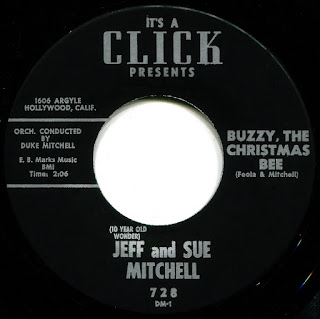DOWNLOAD: More Mervmas and Tu Scendi Dalle Stelle
I guess this will be my December 25 post (in fact, Christmas is nine minutes away). I would have revived more "banned" posts and put up a couple more "new" LPs, but my storage options are limited, and I quickly exceeded Box.com's downloading bandwidth. Which I don't want to do at pixeldrain. MEGA? Won't let me use it. Clearly, I'm the only music blogger uploading material with any copyright-claim potential. Obviously. Oh, and thanks to all who recommended alternate hosting sites.
Things start with three Merv Griffin sides I present every Christmas. The first two--1950's Sleigh Ride and Christmas Time--date from Merv's time as vocalist for the Freddy Martin Orchestra. The third--1962's Christmas City--was recorded by Merv for the annual Christmas City of the North Parade in Duluth, Minnesota. Nice song, well arranged, well recorded, and Merv is fine, my only issue being his pronunciation of "youth"--"Come this Christmas, and you'll suddenly find your youth," which initially sounded to my ears like, "...and you'll suddenly find you're you." Which sort of works, but not nearly as well as "youth."
And I'll skip ahead to the Gilmar Holiday Favorites 45 rpm EP, its A and B sides combined into one file. Both sides feature a continuous groove, with awkward pauses and fades between selection fragments. The engineering ineptitude is of the have-to-hear-it-to-believe type, and many of the recordings are very familiar, though I can't place them. Tops? Eli Oberstein? Maybe I'll have time to find out at some point. I swear that the B side sounds like something cobbled together while the guy at the controls dozed off. ("Wha... what? Oh, yeah, I'm mixing a side. I forgot.")
And the gorgeous Tu Scendi Dalle Stelle (You Come Down From the Stars) is a 1732 Christmas carol featuring words and music by Saint Alphonsus Liguori of Italy. Here's the wonderful comment I received in 2020 by Roberto of Milan, Lombardy. The references are to guesses I'd made in my post:
"Hi, I have some other records from that series -not this one, so thank you very much-. You're right about the interpretation of "4 voci dispari": here it is second case, all-male adult/children. The plaque in the town of Nola (close to Naples, not LA) tells the song was written there in december 1754, yet those were the years indeed. For the Italian generations born no matter when from 19th to 20th century this one was the pretty first Xmas tune to be heard and learned by heart. The child introducing the song is a guest of the Orphanage -turned into a private high scool nowadays-: he calls himself "Ricciolino" [Curly] and he's 13. He's thanking all the benefactors, to whom this record is probably given as a freebie, wishing season greetings to all Italians in and outside the Country -emigrants were still many in 1959, that should be the year- asking everyone to remember and help the lonely like him and his companions. Then the song begins, just first verse and twice refrain. You won't escape the translation, just as horrible as only mine could be:
[O Blessed God!]
You come down from the stars
O King of Heaven
[O King of Heaven]
And come to a cave
In the cold, in the frost
And come to a cave
In the cold, in the frost
O my Divine Child
I see you trembling here
O Blessed God
Ah, how much it did cost you
For loving me!
Ah, how much it did cost you
For loving me! [2]
Even the manufacturer Cellograf-Simp survives today, with production and marketing strategies slightly different though... Always been into plastics, at those times it first finalized others' given masters, later starting an editorial branch of its own (Phonocolor/Style). From late 50s to early 60s it was the main flexis stamper in Italy and yes, a bit more thickness has always featured its production. They were mainly freebies: Italy was living an economic boom back then and after purchasing the right amount of any stuff you always got your flexi thrown to. Sorry the lengthy... Roberto - Milan, Lombardy -not so far from Desenzano-"
Merry Christmas!
Lee


















































